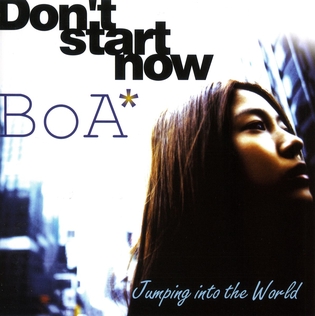
Best of Soul is the second Japanese compilation album by South Korean recording artist BoA. This is her first greatest hits album to contain her Japanese songs. The album was released on February 2, 2005, under Avex Trax.

My Name is the fourth Korean-language studio album by South Korean recording artist BoA, released through SM Entertainment on June 11, 2004. BoA promoted the album with the singles "My Name" and "Spark", the latter of which is a Korean-language cover of "Keep My Cool" (2002) by Luis Fonsi. The album saw BoA's transition into a more mature image in comparison to her previous records.

Jumping Into the World is the first special album by South Korean singer BoA, released on March 8, 2001. It consisted of eight new tracks along English and Chinese versions of the songs "Don't Start Now", "사라 (SARA)", "ID; Peace B". In Korea, the album was titled Don't Start Now.

ID; Peace B is the debut Korean-language studio album by South Korean singer BoA, released on August 25, 2000 by SM Entertainment. It saw moderate levels of success in South Korea upon its release, peaking at number 16 on the Recording Industry Association of Korea's monthly album chart in October 2000. The album sold 156,354 copies in 2000 and was the 59th best-selling album of the year. The album was released on May 29, 2002 in Japan, where it reached number 30 on the Oricon Albums Chart.

Kim Hyun-jung is a South Korean pop singer. Well known as the "Long-legged singer", and with the experience of performing in a heavy metal band, Kim made her debut as a female solo singer with the dance-infused album Legend. The song "Breakup with Her" was a fast-tempo song with strong beats that shot Kim quickly to the top. The song "Lonely Love" was also a great hit. Since her debut, Kim Hyun-jung has succeeded in releasing great songs, usually dance numbers.

"Everlasting" is a song by South Korean recording artist BoA. It was released as her 18th Japanese single under Avex Trax on January 18, 2006, and her 4th physical Korean single under SM Entertainment a week later on January 25, 2006. The leading track "Everlasting" is a ballad, and the B-side track of the Japanese release, "Soundscape", is a mid-tempo song. "People Say..." serves as the B-side track for the South Korean release. The single also contains a "classical version" of "Everlasting".
SM Town is a musical collective for the recording artists under South Korean entertainment company SM Entertainment.

The discography of South Korean musician BoA consists of twenty-one studio albums, eight compilation albums, three extended plays (EPs) and numerous singles. BoA debuted as a musician through South Korean talent agency SM Entertainment at the age of 13 with the album ID; Peace B (2000), followed by her debut in Japan with Avex Trax in 2001.

The discography of South Korean entertainer Rain consists of seven studio albums, one compilation album, three extended plays, and thirty-three singles. His debut studio album Bad Guy was released in May 2002 and sold over 140,000 copies in South Korea. His sophomore studio album, How to Avoid the Sun, was released in October 2003 and spawned the titular single, which ranked at number one of the music program charts for multiple weeks.

Clazziquai Project (Korean: 클래지콰이), also known as Clazziquai, is a South Korean electropop band that combines several genres including electronic music, acid jazz and house. The band's first short unofficial albums were released online in 2001, spreading its music through words of "netizens," who positively received the band's music. They remained underground until the release of their first album Instant Pig in 2004, selling over 80,000 copies. Since then, their music has been used in shows, commercials, and films.

This is the discography of South Korean singer Seven.

Park Hwayobi, more commonly known as Hwayobi, is a South Korean R&B singer-songwriter.
The discography of South Korean vocal group SG Wannabe consists of nine studio albums, five compilation albums, eight video albums, two extended plays, and numerous singles and soundtrack appearances.

The discography of South Korean girl group Brown Eyed Girls consists of seven studio albums, three extended plays, one compilation album and eighteen singles.

This is the discography of the South Korean singer Psy. He is well known for his humorous videos and stage performances, and for his hit single "Gangnam Style", a song about where he came from and which talks about the life of the people of Gangnam, which is a neighborhood in Seoul, South Korea. and his follow-up single "Gentleman".

The discography of South Korean girl group Jewelry consists of eight studio albums, one extended play, twenty-six singles, and two soundtrack appearances. Formed in 2001, the group debuted with the single "I Love You", and had gone through numerous line-up changes before disbanding in January 2015.

The discography of South Korean girl group S.E.S. consists of eight studio albums, six compilation albums, three video albums, and one remix album. The group debuted in 1997 under SM Entertainment and disbanded in 2002. The group made a reunion in 2016 with their sixth Korean studio album.
The discography of South Korean singer and actress Lee Jung-hyun consists of nine studio albums, two extended plays, and one remix album.

The discography of South Korean musician BoA consists of twenty-one studio albums, eight compilation albums, three extended plays (EPs) and numerous singles. Many of her songs have been released bilingually in both territories, such as "Valenti" (2002), "Double" (2003), "Everlasting" (2006) and "Only One" (2012).
















